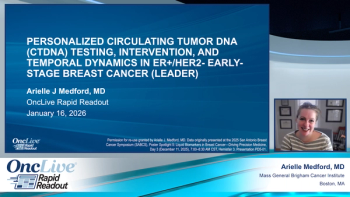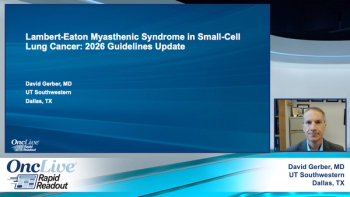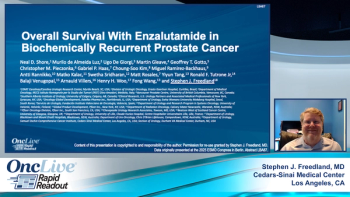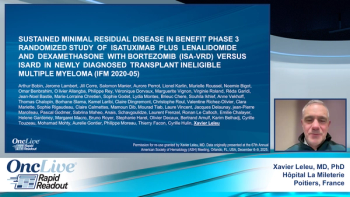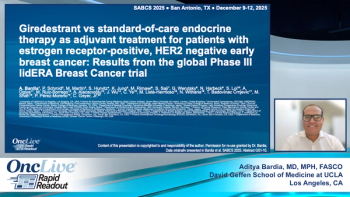
Rapid Readout: Pirtobrutinib, a Highly Selective, Non-Covalent (Reversible) BTK Inhibitor in Previously Treated Mantle Cell Lymphoma: Updated Results from the BRUIN Study
Michael L. Wang, MD, discusses the updated results from the Phase 1/2 BRUIN clinical trial, which focused on the use of pirtobrutinib in previously treated mantle cell lymphoma.
OncLive® Rapid Readout from American Society of Hematology (ASH) 63rd Annual Meeting: Pirtobrutinib, a Highly Selective, Non-Covalent (Reversible) BTK Inhibitor in Previously Treated Mantle Cell Lymphoma: Updated Results from the Phase 1/2 BRUIN Study
Segment Description: Michael L. Wang, MD, discusses the updated results from the Phase 1/2 BRUIN clinical trial, which focused on the use of pirtobrutinib in previously treated mantle cell lymphoma. (
Segment Body Content:
- Covalent BTK inhibitors (BTKi) have transformed the management of mantle cell lymphoma (MCL), but these treatments are not curative, and the majority of patients will require additional treatment.
- Covalent BTKi share pharmacologic liabilities (eg, low oral bioavailability, short half-life) that collectively may lead to suboptimal BTK target coverage—for example, in rapidly proliferating tumors with high BTK protein turnover, such as MCL.
- To address these limitations, pirtobrutinib, a highly selective, non-covalent BTKi that inhibits both wild type (WT) and C481-mutated BTK with equal low nM potency was developed. In the phase 1/2 BRUIN study, pirtobrutinib achieved pharmacokinetic exposures that exceeded its BTK IC96 at trough, was well tolerated and demonstrated promising efficacy in heavily pretreated, poor-prognosis MCL patients, most of whom had prior treatment with a covalent BTKi
Methods
- BRUIN is a multicenter phase 1/2 study (NCT03740529) of oral pirtobrutinib monotherapy in pts with advanced B-cell malignancies who have received >2 prior therapies.
- Pirtobrutinib was dose escalated in a standard 3+3 design in 28-day cycles.
- The primary objective for phase 1 was to determine the recommended phase 2 dose (RP2D) and the primary objective of phase 2 was overall response rate (ORR); secondary objectives included duration of response (DoR), progression-free survival (PFS), overall survival (OS), safety and tolerability, and pharmacokinetics.
- Efficacy evaluable pts included all dosed patients who underwent their first response evaluation or discontinued therapy. Response was assessed every 8 weeks from cycle 3, and every 12 weeks from cycle 13 and was measured according to Lugano Classification. Safety was assessed in all pts (CLL/SLL and NHL).
Results
- As of 27 September 2020, 323 patients (170 CLL/SLL, 61 MCL, 26 WM, 26 DLBCL, 13 MZL, 12 FL, 9 RT, and 6 other NHL [other transformation, B-PLL and hairy cell leukemia]) were treated on 7 dose levels (25-300mg QD). Median age was 69 (range 50-87) years for MCL patients.
- Among the 61 MCL patients, median number of prior lines of therapy was 3 (range, 1-8) and a majority of them had received a prior BTKi (93%), an anti-CD20 antibody (98%) or chemotherapy (92%). No DLTs were reported and MTD was not reached (n=323). 200mg QD was selected as the RP2D.
- Fatigue (20%), diarrhea (17%), and contusion (13%) were the most frequent treatment-emergent adverse events regardless of attribution or grade seen in >10% of pts (n=323). The most common adverse event of grade ≥3 was neutropenia (10%). Treatment-related hemorrhage and hypertension occurred in 5 (2%) and 4 (1%) patients, respectively. Five (1%) patients discontinued due to treatment-related adverse events.
- At the efficacy cutoff date, 52 prior BTKi treated MCL patients were efficacy evaluable with an ORR of 52% (95% CI 38-66; 13 CR [25%], 14 PR [27%], 9 SD [17%], 11 PD [21%] and 5 [10%] pts discontinued prior to first response assessment).
- Median follow up was 6 months (range 0.7-18.3+). Responses were observed in 9/14 patients (64%) with prior autologous or allogeneic stem cell transplant, and 2 of 2 with prior CAR-T cell therapy.
Conclusion
- Pirtobrutinib demonstrated promising efficacy in heavily pretreated, poor-prognosis MCL following multiple prior lines of therapy, including a covalent BTKi. Pirtobrutinib was well tolerated and exhibited a wide therapeutic index. Updated data, including approximately 60 new pts with MCL and an additional 10 months since the prior data cut will be presented.


